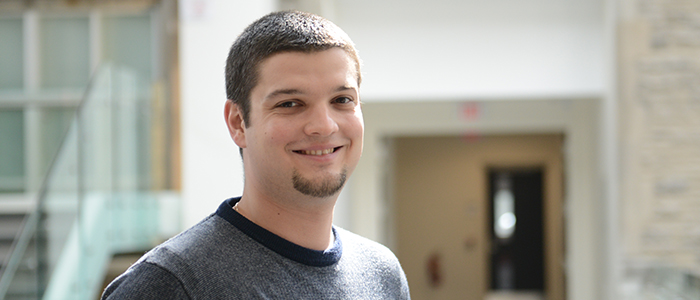Dr. Ryan Renn receives Dr. Dana Winterburn Memorial Award

The Dr. Dana Winterburn Memorial Award was presented to Dr. Ryan Renn at the Schulich School of Medicine & Dentistry convocation held at Western University on Friday, May 13.
The award was created to honour Dana's outstanding commitment to family medicine and the communities which she served in her lifetime. It is awarded to a student who may exemplify many of Dana's virtues of having strong leadership skills, an interest in palliative care, aboriginal health issues and mental health in addition to being a highly skilled clinician with strong patient-doctor relationships.
Dr. Renn is from the town of Caledonia and the neighbouring Six Nations of the Grand River, located in Oshweken.
Upon receiving the email to apply for the available undergraduate graduation awards, he was inundated with emails and messages.
“All my friends and colleagues sent me the link saying that the Dr. Dana Winterburn award was perfect for me,” said Dr. Renn. "It's nice that there is an award available for someone who has an interest in aboriginal health, as it's so important and relevant today."
Dr. Renn entered Schulich Medicine in 2012, filling one of three seats the School reserves for First Nations, Metis or Inuit students in each year of the MD program. Prior to that, he had studied at Brock University in St. Catherines for six years, completing a bachelor of science in neurobiology and a master’s degree in behavioural neuroscience.
He will soon start his residency training in family medicine through McMaster University and will practice on the Six Nations reserve.
“Six Nations reserve is home. My mom’s side of the family is from there. My grandmother still lives there. I would love to stay and practice in the area.”
During his medical training at Schulich Medicine, Dr. Renn explored aboriginal health and culture. He joined the Aboriginal Health Advocacy Group at the School in his first and second years and worked at the Southwest Ontario Aboriginal Health Access Centre (SOAHAC) in London.
A clinical experience in his final year brought him to Little Current on Manitoulin Island. During the rotation he had the opportunity to visit reserves around the island and the experience made an impact.
“I discovered that I love the north. I love the outdoors,” said Dr. Renn.
Also, for Dr. Renn, understanding that isolated and remote communities in the north have significant health barriers sometimes not experienced in southern more urban communities makes the north an attractive place to practice.
Regardless of where he ends up, he has made it clear; he would like to always be involved in aboriginal health, either on a reserve or in a community nearby.
"Aboriginal health [is not] something that can be fixed overnight; the mental health incidences we are seeing have been passed on through generations, and likely stemmed from the residential schools,” said Dr. Renn. “They will not be fixed overnight; it will take a long time. But mental health is improving, our awareness is improving.”
In receiving the Dr. Dana Winterburn Memorial Award, Dr. Renn once again expressed his gratitude for an award that recognizes those who make a contribution to that part of healthcare. He stressed the need for cultural sensitivity and noted the importance of health care workers being aware and practicing with sensitivity when helping those coming from remote reserves to larger urban centres.
“When all is said and done, I would like to make a contribution to that piece of the pie, in whatever community I serve.”








